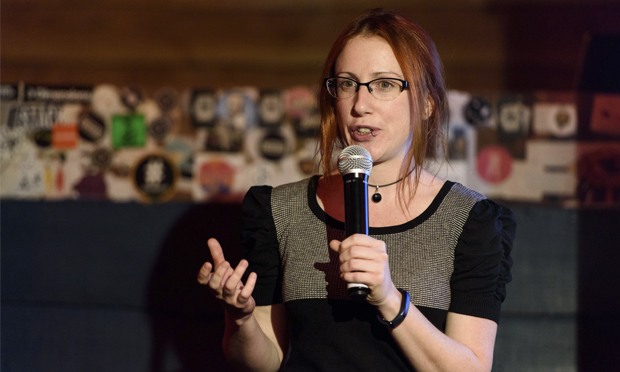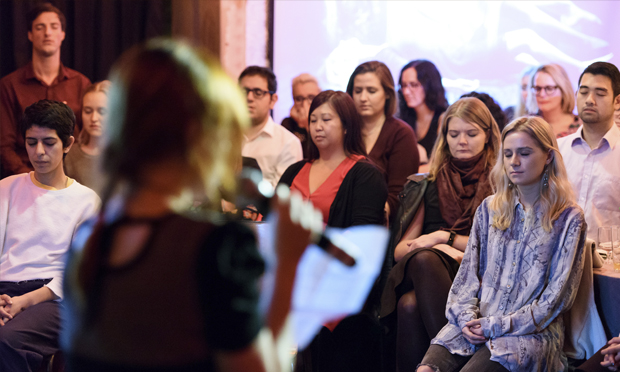Dream holiday: we talk to a lucid dreaming expert ahead of a sleepy night in Shoreditch

Only in dreams: Dr. Josie Malinowski. Photograph: Guerilla Science
An oneironaut, rather than being a golfing term or name for somebody who only has one iron, is the title given to those able to control their unconscious psyche, to such a degree that they can travel through their own dreams.
Lucid dreaming enthusiasts report that the unique state – where you’re aware that you’re dreaming but remain in the dream world – gives them an unbelievable amount of control over the night’s unconscious activity.
People have flown around the world, summoned up departed loved ones, and defeated long-standing nightmares by harnessing lucid dreaming (as well as some raunchier outcomes that I’m sure you can guess.)
But how does one plunge into the dreamscape? We spoke to Dr. Josie Malinowski, lecturer in Psychology at the University of East London and keen oneirologist.
She’ll be telling all, alongside neuroscientist and sleepy tea specialist Rachel Williams and filmmaker/musician/’dream guide’ Tree Carr, at Lessons in Lucid Dreaming on Wednesday 24 January at The Book Club in Shoreditch:
What can attendees expect from the evening, in terms of their oneironautical training?
Attendees will learn eight lessons from the science of lucid dreaming: 1) what lucid dreams are; 2) how scientists were first able to verify the existence of lucid dreaming; 3) when in the night lucid dreams are most likely to occur; 4) the most effective method for inducing a lucid dream, according to science; 5) what you can do in a lucid dream; 6) whether lucid dreams can be used therapeutically; 7) the neuroscience of lucid dreaming; and 8) what extraordinary possibilities lucid dreaming may hold.
Lucid dreaming is said to enable you to ‘live out your wildest fantasies’. Can the subconscious brain really be controlled and trained to this extent?
Yes, absolutely, the dreaming brain can be trained to become lucid enough to allow the dreamer to play out their fantasies, though the dream does always seem to retain an element of control – we’re never completely in control of a dream, even when lucid.
When interested people talk to you about this subject, is there a common thread of what they wish to get out of the experience? Does everyone want to fly, or live a different life, or are people’s goals quite individualised?
The two Fs are the most popular things to do in a lucid dream – flying and, er, ‘mating’. But the more a person experiences lucid dreaming the more they tend to experiment with what’s possible.
Some people want to talk to the hidden parts of themselves by conversing with their dream characters; others want to test the limits of their imaginations, explore other worlds, explore the cosmos, explore other beings, etc.; some want to get creative ideas from their dreams; for others it’s more of a spiritual practice.
There are common threads, but it’s different for everyone, just as non-lucid dreams are different for everyone.

Sleepytime: participants in a past oneironautical workshop get to grips with their unconscious. Photograph: Guerilla Science
Is there any danger involved in reaching such a space between sleeping and wakefulness? I’m thinking sleepwalking murderers and such…
Yes, there are some parasomnias (sleep disorders) that can be dangerous both for the sleeper and for other people – people have committed (and been convicted for) crimes while sleepwalking, injured bed partners by accident while experiencing REM sleep behaviour disorder, injured themselves, etc.
Lucid dreaming is a relatively safe liminal space as the dreamer stays safely tucked up in bed during a lucid dream, but lucid dreams come with their own dangers too, such as the lucid dream becoming a lucid nightmare.
Do you have any tips for people who can hardly remember their dreams, let alone take control of them?
People who are very deep sleepers tend to really struggle to recall dreams, but for the rest of us attention and practice are almost guaranteed to up your dream recall.
As soon as you start paying attention to dreams, giving yourself time in the morning to sit quietly with them before you get up, writing them down, talking about them with other people, etc. recall increases.
My advice to someone who wants to increase their recall would be to set the intention to recall a dream before bed; then in the morning, to lie still with their eyes shut when they wake up, and try to let themselves stay with any dream memories they have, calling them back and committing them to waking memory; and then when they get up, write them down in a journal.
It might be frustrating to begin with, it might take a bit of practice, but within a couple of weeks they should be recalling many more dreams. The trick is to try not to let waking life flood into your consciousness as soon as you wake up, but to stay with dreaming consciousness while you’re still sleepy upon awakening.
Failing that, setting an alarm earlier than normal will probably cause you wake up in the middle of dream, but will also probably interrupt it!
Lessons in Lucid Dreaming takes place on Wednesday 24 January, 7.30 – 10.00pm at The Book Club in Shoreditch. Tickets are £10 in advance, and available through this Eventbrite page. The event is presented by Guerilla Science.
